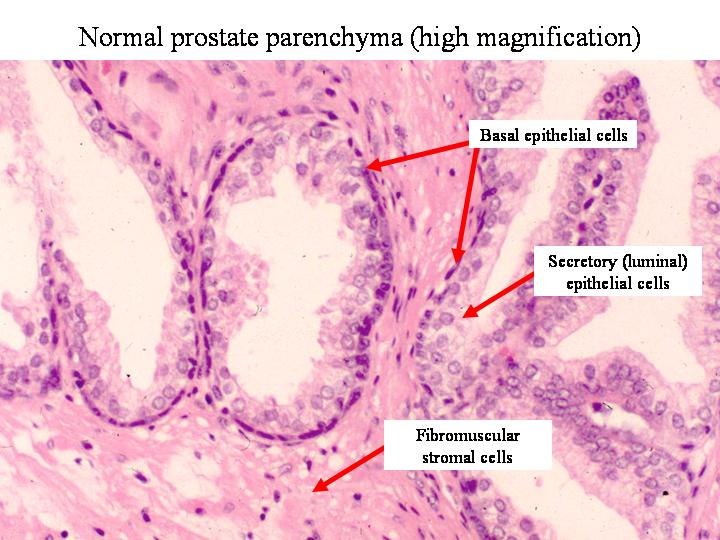The cause of prostate cancer is unknown, but the cancer is not thought to be related to benign prostatic hyperplasia (BPH). The risk (predisposing) factors for prostate cancer include advancing age, genetics (heredity), hormonal influences, and such environmental factors as toxins, chemicals, and industrial products. The chances of developing prostate cancer increase with age. Thus, prostate cancer under age 40 is extremely rare, while it is common in men older than 80 years of age. As a matter of fact, some studies have suggested that among men over 80 years of age, 50%-80% of them may have prostate cancer! More than 80% of prostate cancers are diagnosed in men older than 65 years of age.
As mentioned previously, African-American men are 1.6 times more likely than white men to develop prostate cancer. They are also 2.4 times more likely to die from their disease as compared to white men of a similar age. These differences in diagnosis and death rates are, however, more likely to reflect a difference in factors such as environmental exposure, diet, lifestyle, and health-seeking behavior rather than any racial susceptibility to prostate cancer. Recent studies indicate that this disparity is progressively decreasing with chances of complete cure in men undergoing treatment for organ-confined prostate cancer (cancer that is limited to within the prostate without spread outside the confines of the prostate gland), irrespective of race.
Genetics (heredity), as just mentioned, plays a role in the risk of developing a prostate cancer. Prostate cancer is more common among family members of individuals with prostate cancer. This risk may be two to three times greater than the risk for men without a family history of the disease. Earlier age at diagnosis (<60 years) in a first-degree relative (father or brother) and disease affecting more than one relative also increases the risk for developing prostate cancer.
Testosterone, the male hormone produced by the testicles, directly stimulates the growth of both normal prostate tissue and prostate cancer cells. Not surprisingly, therefore, this hormone is thought to be involved in the development and growth of prostate cancer. The important implication of the role of this hormone is that decreasing the level of testosterone should be (and usually is) effective in inhibiting the growth of prostate cancer.
Recent evidence has suggested that sexually transmitted infections are risk factors for developing prostate cancer. Men with a history of sexually transmitted infections have a 1.4 times greater chance of developing prostate cancer as compared men without this history.
Although still unproven, environmental factors, such as cigarette smoking and diets that are high in saturated fat, seem to increase the risk of prostate cancer. There is also a suggestion that obesity leads to an increased risk of having more aggressive, larger prostate cancer, which results in a poorer outcome after treatment. Additional substances or toxins in the environment or from industrial sources might also promote the development of prostate cancer, but these have not yet been clearly identified. Geographical influences also seem to play a role in the development of prostate cancer with men living in the Scandinavian and North American countries being at a higher risk for the disease as compared to those residing in Asian countries.
Of note, there is no proven relationship between the frequency of sexual activity and the chances of developing prostate cancer.
http://www.medicinenet.com/prostate_cancer/page3.htm


3 comments:
If you are going for best contents like me, just pay a visit
this website everyday for the reason that it presents feature
contents, thanks
Have a look at my web site; kuat obat
e cigarette, smokeless cigarette, electronic cigarette, best electronic cigarette, electronic cigarette, electronic cigarettes
Everyone here i think would have gotten a piece of their share from cancer, with some being able to survive and others dying even with the high efforts of oncologists. I had lungs cancer due to the fact that i was a hardcore smoker Due to the terrain in Alaska. I started to have symptoms in 2008 and i was diagnosed in April 2009. Several treatment therapies like chemotherapy and radiotherapy were prescribed but none seemed to help me. I had just less than a year to live. Less than 6 months to go i read about Doctor Roland who is a herbal doctor that treats cancer. At first i doubted because my case was chronic and even if he could help it was already late. I had nothing to lose so i contacted him and he was very encouraging even in my condition and i placed an order for the herbal medicine which i used for 3 months. Even before i was done using it i felt strong and after it all i went for diagnosis and i tested negative. This is a permanent cure because it's been three years from my supposed death and i am still very strong and alive. Do not give up soon on yourself just reach him on (dr.rolandoscar@gmail.com) i am positive that if i can be cured you too can. I pray for all cancer patients worldwide.
Post a Comment